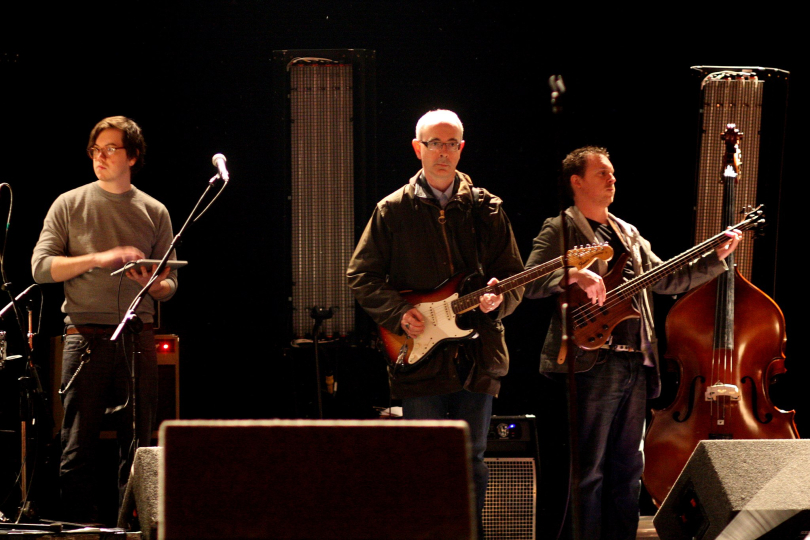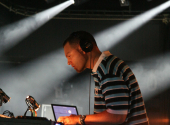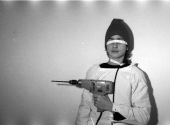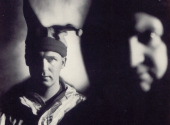
Milestones in Music History #28: Virgin Prunes, Remember to Always Dare
Genesis P-Orridge and his Psychic TV, as we saw in our previous Milestone, greatly contributed to the development of underground art rock music in the 1980s. A new scenario was presented, in which human inspiration could express itself in its best way, through freedom. Rock and punk music acquired decidedly dark colours towards the end of the '70s. The term "music" went from defining not only a composition of notes to being a forge of experimentation and innovation – sometimes to the extreme. Since the musical world intersected with visual arts and theatre, this mixture was surprising and captivating and invigorated the environment of musicians. Not only that, but in alternative music people could find expression for their perversions and morbid desires which led to a greater interest in the inner self. A new path had to be paved and Virgin Prunes showed up for the task.
It all started with a teenage party in Dublin. Precisely in the Northside, in the area called Ballygall, in the Glasnevin district. And probably around Cedarwood Road, where Gavin Friday (born Fionán Martin Hanvey) used to live. Paul David Hewson had his apartment not far from Gavin. Probably most people know him today only by his stage name, Bono.
Bono and Guggi (born Derek Rowen) were attending the aforementioned party and Bono found Gavin stealing something from the house where the party was and to which he was not invited. There they met each other for the first time and became friends. It was probably in the early 70s that the trio founded Lypton Village, which was not only a band but also a musical and religious community.
However, Guggi and Friday soon departed from Bono to focus on more experimental music, and they gave life to extreme and outrageous live sets. They started performing in small clubs in Dublin, and that is where they began to acquire more and more popularity.
There was also a change in the lineup, as Gavin Friday and Guggi were joined by the guitarist Dik Evans (brother of U2's The Edge), the bassist Strongman (brother of Guggi), and Antony Murphy, a.k.a. Pod, on the drums. Pod was eventually replaced by Haa-Lacka Binttii (born Daniel Figgis), who also would play tape loops and keyboards. Also, a third vocalist joined the band, Dave-iD Busaras.
The so-formed band obtained a deal with Rough Trade Records and they released the single "Twenty Tens" at the beginning of 1981 on their label Baby Records and through Rough Trade. Still in that year, at the beginning of the summer, another single was released, "Moments and Mine (Despite Straight Lines)".
Two other singles were recorded and released in the same year, "Red Nettle" (appearing on the NME cassette compilation C81) and "Third Secret" (which was included in the Cherry Red compilation Perspectives and Distortion). Soon afterwards, the drummer Pod left the band to be substituted by Mary D'Nellon (né David Kelly).
However, while Pod was still on drums, the band started working on their first record, a concept album split into four parts, A New Form of Beauty 1-4. The work released eventually at the end of 1981 gathered the first band recordings but also more recent production. On one hand, we find ballads, electro-synthpop and soothing melodies. On the other hand, the record made clear the band's direction, and their intent to experiment, while creating disturbingly obsessive musical environments.
Their first work was pervaded by obsessive and syncopated melodies, accompanied by redundant and delayed guitars. Everything was finely seasoned by Friday's strident and incisive voice, who juggled the songs on the album with almost childish lasciviousness. It was still a primitive work, but one that left its mark. And that highlighted the characteristics of the band.
The following year, the band prepared and released in November what was to become their most important work, the seminal ...If I Die, I Die, together with the EP Hérésie. ...If I Die, I Die represented a journey into the contradictions and convulsions of the human mind. There was a basic mysticism, a religious sensibility however deviated, and surrounded by gloomy, dark atmospheres.
It has been well received, and it was included in Chuck Eddy’s Spin essential gothic rock albums chart. Slightly different was the path taken for Hérésie, which had been commissioned to the band by the label L'Invitation Au Suicide, to create a work centred on the topic of mental insanity.
Every track opened with the same intro, a creepy squeaking flute-like melody. It initially seemed like a companion piece to the album ...If I Die, I Die, but it turned out to be a much more complex project. The theatricality of the singing became more aggressive and anticipated the post-punk of the years to come. Even the sounds were more pressing and more evil.
It seemed like taking a journey into the human mind, but without a guide and brakes and in a full hallucinatory state. There was extensive research into the human soul, a visceral study of the human state, in which the listener was a fully active participant. Listening to the record, it felt like embarking on such a journey, a trip where there was a clear beginning, but no exact destination.
After some changes of course and lineup, the band, who had been working on the album Sons Find Devils and then abandoned it later, began the creation of their second studio album, The Moon Looked Down and Laughed. The disc was released in July 1986.
It almost seemed like the natural continuation of the two previous releases. If the journey of the first two albums seemed to lead to hell (Hérésie) and purgatory (...If I Die, I Die), with The Moon Looked Down and Laughed we arrived at paradise, which happens to be also the opening track of the album, entitled "Heaven".
The sounds were more subdued and lightened. The musical carpet now seemed more linear, less chaotic. Their intentions were always the same but probably faced now with a different awareness. The same awareness with which Gavin Friday announced his departure from the band soon after.
An attempt was made by the other members of the band to keep the act going, although this time under the name The Prunes, but it was not very successful. Daniel Figgis became a composer and multimedia curator, Guggi remained in Ireland to work solo on his music and paintings, while Gavin Friday embarked on a dazzling solo career.
Friday produced five solo albums, and he started his career in movies, acting for the first time in the 2001 movie Disco Pigs, and then he played again, as an actor but also as a singer, in the 2005 extravagant movie Breakfast on Pluto. He also released the score for this movie, and many others – to mention some: The Boxer (1997), Moulin Rouge! (2001) and Get Rich or Die Tryin' (2005). On the 15th of December 2022, a documentary was aired by RTÉ 1 about the artist Francis Bacon, with music written and produced by Gavin Friday and Michael Heffernan.
What Virgin Prunes created was not just avant-garde and experimentation. Gavin Friday and associates contributed greatly to the birth and development of post-punk. Not only that, Friday's psychotic vocals and the disturbing melodies they were able to produce outlined a new path for alternative art rock, surrounded by mysticism and religion. Spirituality was used however not as a relief but as a cursed companion of our earthly vicissitudes.
Their attitude and ability to go beyond the boundaries of the music of their time made them eternal. Their music inspired various artists, and even Bono and U2, linked to the band from the beginning, felt the need to return to that world, and they did it with Zooropa.
But other artists were also inspired by Friday and his colleagues, coming from musical situations in some ways very different from those of the Virgin Prunes. One of them was Aphex Twin, especially with his work Selected Ambient Works Vol.1, which we will talk about in our next Milestone.
What sonic impact did the Virgin Prunes have on the music of the years to come? Can music also represent psychological disorders and spiritual problems? And how? Can today's music be considered mystical? Who are the artists who combine religion, theatre and music today?
Leave your opinion in the comments below!
If you have found an error or typo in the article, please let us know by e-mail info@insounder.org.





